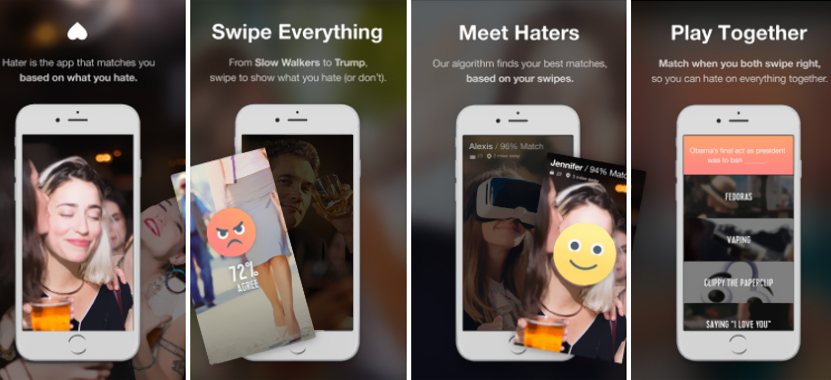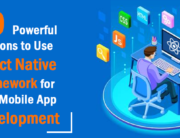Sometime in early February, the ex-Goldman Sachs employee, Brendan Alper launched his app, Hater, for iOS. As the name suggests, this app is similar to other dating apps like Tinder, but the difference is that it matches people based on what they “Hate”. The beta version which was available since December was very well received and the official release of the final version was scheduled for February.
The iOS app made it to the list of top grossing apps in no time with over 50,000 downloads in just a couple of months. Needless to say, it did achieve what it initially aimed for and now is growing at an exponential rate.
So what is there for us to learn from Hater? Well, it teaches us 5 key things to succeed as a dating app:
1. Find the Right Audience.

There are so many big players in the online dating market today that it’s tough to gain traction in the general marketplace. Hater found its audience in the millennial circles by emphasizing on one particular focus which was “Hate” and it did pretty well in it. Finding your focus, no matter how quirky it may be, is the first step to reach the right audience. With a better focus and more targeted audience, your chances of success increase easily.
2. Choose the Right Business Model. Online dating sites can operate on either an advertising or a subscription based model or even a combination of the two. For the time being, Hater is free to use, however, once it gets a hold of the market, it will incorporate a subscription based model which will be a lot more beneficial for it given its audience. If your app is attracting a small group of people with a much targeted focus (for instance a trek loving audience who meet up for treks) then a subscription based model would be best for you. However, if your market is huge, the advertising could be equally good. If both of these don’t fit your needs, you can always have the Freemium model, free to use but offering a few extra features on paying some money.
3. Using the Right Algorithm.

Online matchmaking services typically ask users to fill out questionnaires about their lifestyle, hobbies, work, and other interests. Hater uses a simple questionnaire asking whether the users love or hate the series of things it lists. Then based on your level of hatred for a specific thing, it shows you your best matches. While deciding on an algorithm, always think about what values will be the most important to your potential users — and how you should rank their matches. Once you’ve determined this, partner with an experienced dating app development firm to set up your search tool.
4. Luring in your Customers. No one wants to download a dating app that very few people use, so you’ll want to market your app well and provide added incentives to sign up initial members. Obviously, these campaigns should be catered according to your audience. Hater utilized the technique of a soft launch along with a few simple online marketing tactics to bring in their targeted audience which worked perfectly. Once initial members have signed up, you can analyze and tailor your app features and marketing campaigns even more based on their behavior.
5. Maintain quality control.

Dating apps must be prepared to cope with sexual harassment and other forms of online abuse, as well as privacy concerns. Even though Hater centers around hate, it doesn’t actually encourage negative behavior. It has a one-strike policy for any anyone who acts in a way the users wouldn’t want to swipe down on. It is always best to set up a system that allows users to flag others for bad behavior, and rescind the membership privileges of abusers.
Hater proves without doubt that a good development strategy will always have a great impact. The only mistake that Hater did was to launch it just on the iOS platform initially and not both on Android and iOS. However, they are quick in their response and are working hard to rectify this. Hater will be soon be released for Android too. If continued this way, it could be that Hater might surpass other dating apps pretty soon.







How does the freemium model work for dating apps? I mean most of the app’s features that are required to entice a user to pay for it are enough to get the person a date. then why would they pay for it?
@Gene. We understand your concern. To give your audience an idea, you could always put some kind of restrictions like the number of people they can like, the total number of people that will be visible to them, limit the number of matches they get etc. You could also keep displaying ads to the free users for revenue.
I beleive that Hater launched the app only on iOS just to see its response. Now that its good, it will launch for Android too.
@Kim, It is never advisable to launch an app only on one platform especially if you wish to see its response. Hater got a good response due to a number of factors which include intense media coverage. The same can not be true for all new dating apps. Launching on all major platforms exposes you to a larger customer base and gives you a better idea of your response.
But what if they didn’t have the budget to launch on both apps?
Well in that case, they could have gone for a cross platform app. It is a more cost effective and efficient solution for such a situation.
If we have a system for people to flag others, how can we make sure people don’t just randomly flag each other?
@Ryan,In order to avoid this, you need to have a double step check in order for a user to be flagged. Firstly, send an automated request to the user asking for the reason of this action.Once this is done, have a system that notifies the admin. Then as the admin, you can manually take a look into the matter. Until the matter is taken care of, you can put both of the accounts in a temporary hold to avoid misuse.